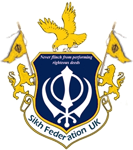PRITI PATEL INITIATES EXTRADITION OF THREE BRITISH SIKH ACTIVISTS TO INDIA
Arrests follow Dominic Raab’s visit to India last week and Boris Johnson’s planned visit next month to start negotiations on a free trade agreement with India
London – 23 December 2020
In the early hours of Monday, the homes of three British Sikh activists in the West Midlands were raided. Two are from Coventry and one from Wolverhampton.
At approximately 6am West Midlands police smashed down their front doors and took all three of them away to London to appear at Westminster Magistrates Court in the afternoon.
The wives and young children of the three have been left traumatised by the dawn raids and are extremely worried by the threat of extradition to India of their loved ones.
Leading lawyer and human rights activist Gareth Pierce, who has worked on several high-profile cases, including the Guilford Four arranged for their representation in court.
The Crown Prosecution Service (CPS) turned up unprepared suggesting they were pushed to appear at short notice and simply argued the three should not be given bail.
The judge disagreed and the three were remanded in custody at HMP Wandsworth overnight to appear again the next day for a bail hearing. The three have been granted bail and are now back with their families.
If the extradition case proceeds there will be a preliminary hearing where the judge will set a date for an extradition hearing.
Many in the Sikh community are deeply concerned these raids are linked to Dominic Raab’s visit to India last week where he also met with Ajit Doval, the National Security Adviser who is believed to have pushed for their extradition. It is almost certain the visit has triggered the extradition process to begin.
Extradition to India is under Section 70 of the Extradition Act 2003 and this requires the Home Secretary to certify the extradition request and send it to the court for a judge to issue arrest warrants.
It is understood India is demanding their extradition for an offence that took place in India more than 11 years ago in July 2009 when all three were in their 20s.
The Indian police initially registered a case against unidentified persons in July 2009 and arrested four persons from India, but later let them go. Later in September 2009, the Indian police arrested five others from India who were eventually acquitted in February 2015. More than 10 years ago four Britons were arrested and questioned regarding the killing of a man in India linked to the Hindu supremacist paramilitary organisation Rashtriya Swayamsevak Sangh.
Following questioning, all four men were released on police bail and in January 2011 they were also released from bail without charge.
The UK is looking to establish a Free Trade Agreement with India therefore it is assumed the Indian authorities used the opportunity to push Dominic Raab on the extradition of the three British Sikh activists. They also know they have a Home Secretary in Priti Patel who rarely plays by the rules and is an enthusiastic supporter of the Narendra Modi BJP Government.
Some are also speculating the arrests may have a direct link with Jagtar Singh Johal a 32-year old from Dumbarton who had just got married in India and was abducted by plain clothed Indian police. He was subject to third degree torture and has been held in an Indian jail for more than three years.
Despite the torture, a so-called confessional video released to Indian TV and trial by media the Indian authorities have been struggling to produce any evidence in court for the last three years to substantiate the false charges against him.
In September 2018 British terror police assisted by Indian police officers raided the homes of five British Sikh activists linked to the #FreeJaggiNow campaign and took away computers, paperwork and other material. The five were never arrested or charged and two years later some of the information taken away has still to be returned.
Incredibly the names, addresses and photographs of some of these activists obtained during the raids immediately appeared in Indian newspapers emphasising the close working between police and intelligence in the two countries.
This collusion between British and Indian police that led to this serious indiscretion instantly put the lives of the individuals named and pictured at serious risk if they ever visited India. It is understood two of those arrested on Monday are those who have repeatedly been named and pictured in Indian newspapers.
If there is an extradition hearing one of the main considerations for the judge will be if extradition to India would breach their human rights. The European Convention of Human Rights and UK law will almost certainly not allow extradition to India as it retains the death penalty for the crime the three are accused.
Bhai Amrik Singh, the Chair of the Sikh Federation (UK) said:
“Given India retains the death penalty and its appalling track record on human rights it is impossible to see how extradition to India will be granted by a British judge.”
“If the three are extradited they would almost certainly be tortured and have no chance of a fair trial.”
“No one has been able to explain why their homes needed to be raided in the early hours and their doors smashed down for a crime committed 11 years ago in India and for which they were questioned and released 10 years earlier.”
“The heavy-handed police approach, arrests and attempted extradition appear to be there to appease the Indian authorities at a time when the UK is interested to begin discussions on a free trade agreement and before Boris Johnson’s controversial visit to India.”
ENDS Harnek Singh National Press Secretary Sikh Federation (UK) info@sikhfeduk.com
